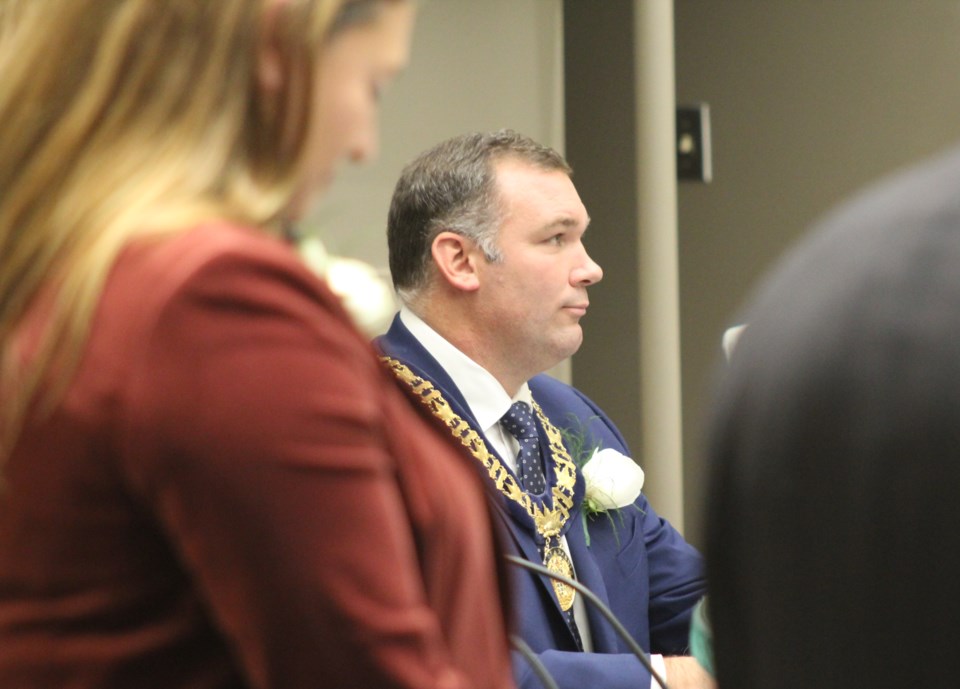The direct approach went off nearly without a hitch.
City council approved two direct motions Wednesday night involving so-called strong mayor powers and the upcoming 2024 budget process, which sets both property taxes and service levels in Barrie.
But not before some councillors wondered aloud how it would actually work when budget talks begin later this month and stretch into December, January and February.
Ontario’s Municipal Act says a mayor may veto an amendment to the budget passed by a council motion, but council may then override the mayor’s veto if two-thirds of councillors vote to override within 15 days of the mayor’s veto.
But council can pass a resolution to shorten the 15-day override period, and this is the first direct motion. Council has shortened the time period to override any veto of the mayor to five business days from 15 for the city’s operating, capital and service partner (Barrie police, County of Simcoe, Barrie Public Library, etc.) budgets.
The Municipal Act also provides that council may pass a resolution to shorten the 30-day period to pass amendments to the budget after it is provided by the mayor. Barrie councillors will be receiving the city’s operating and capital budgets on Nov. 15 and the service partner budgets on Jan. 17, 2024.
The second approved direct motion is that council will shorten the 30-day time period to pass such amendments to Barrie’ operating and capital budgets to Dec. 6 and service partner budgets to Jan. 31, 2024.

“We’re talking about a brand new process,” said Coun. Ann-Marie Kungl.
“I think 15 down to five is a big jump,” said Coun. Amy Courser. “And as we’re working through some heavy duty binders of information, I think that we would be allowed to have a little more information, to have a little more space to actually make those kind of decisions.”
“To me, that five days is a pretty short time frame,” said Coun. Bryn Hamilton.
But the process works for other councillors.
“Is five days enough for myself … to consider whether we want to challenge a mayoral veto? That’s the question, not the budget,” said Coun. Sergio Morales. “And for me that’s yes.”
“I don’t expect a veto or an override, but it seems to me that if that kind of situation arises we still can manage it with this timeline,” said Coun. Clare Riepma.
“I don’t see that anybody is even going to need five days to figure out whether they like it or they don’t like it, and decide to then go down this road or not,” said Coun. Gary Harvey. “With how smooth our budget process went last year, I’m not expecting this timeline to even kick in.”
Mayor Alex Nuttall has said he doesn’t anticipate using the strong mayor powers, but noted the budget process was changed by the province when it introduced these powers.
“I don’t anticipate this being used, but … you need to be ready for the worst-case scenario, not the best-case scenario,” he said of the timeline changes.
The Ontario government announced last summer it was expanding so-called 'strong mayor' powers July 1 to the mayors of 26 large and fast-growing municipalities, including Barrie, which have committed to a housing pledge as part of the province’s goal to build 1.5 million homes by 2031. Previously only Toronto and Ottawa’s mayors had these powers.
Strong mayor powers are to offer tools to help heads of council cut red tape and speed up the delivery of key shared municipal-provincial priorities, such as housing, transit and infrastructure in their municipalities, according to the province.
The powers granted to these mayors include a veto on council decisions conflicting with those provincial priorities, although a two-thirds majority of council can override the mayor’s veto.
These powers also include allowing mayors to propose housing-related bylaws and pass them with the support of one-third of councillors, as well as override council approval of bylaws, such as a zoning bylaw, that would stall home building.
Nuttall said June 16 he was unsure if he would need the strong mayor powers granted to Barrie by the province, but the mayor didn’t disagree with expanding the powers to the mayors of this city.
As things now stand, council members, including Nuttall, are to get their budget binders Nov. 15, with all the operating and capital spending details. At the finance and responsible governance committee meeting Nov. 22, city staff present the budgets.
The budgets then go to general committee Nov. 29 and perhaps beyond, depending upon whether they can be discussed and approved on one night. Council could give the city portion of the 2024 budgets approval Dec. 6.
Service partners make their presentation to councillors on Jan. 31, 2024, then those budgets go to general committee on Feb. 7 and council on Feb. 14.
Craig Millar, the city’s chief financial officer, noted the strong mayors regulations allow a change in the timelines to fit into a municipality’s budget cycle.
There are also fiscal reasons for that schedule.
“We’re trying to make sure that our capital budget gets approved by council in December … it’s really trying to get better prices,” he said. “There are actually a few RFPs (requests for proposals) that are out to market that are dependent on the budget being passed around this time (December).
“The vendors will hold the prices to the end of the year, then Jan. 1 usually prices go up.”

